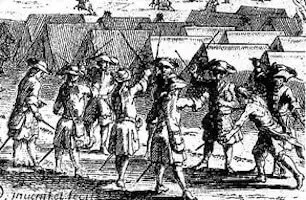To ‘run the gauntlet’ is to face a barrage of criticism or harsh treatment.
For example, you could say:
– The CEO had to run the gauntlet of media criticism after the company’s stock price plummeted.
To ‘run the gauntlet’ is to face a barrage of criticism or harsh treatment.
For example, you could say:
– The CEO had to run the gauntlet of media criticism after the company’s stock price plummeted.
Gauntlets are sturdy gloves commonly used for gardening and other tasks. But back in medieval times, gauntlets were part of a knight’s armor, often made of steel plates and used for both defense and attack.
In those days, when a dispute arose among nobles, they would literally “throw down the gauntlet” as a challenge to a duel. This phrase first appeared in Hall’s Chronicles of Richard III, 1548:
“Makynge a proclamacion, that whosoeuer would saie that kynge Richard was not lawefully kynge, he woulde fighte with hym at the vtteraunce, and threwe downe his gauntlet.”
Another old custom involved a harsh punishment called “running the gauntlet.” Offenders were stripped to the waist and forced to run between two rows of soldiers who whipped and beat them. These beatings were so severe that the victims often died – and many of those that didn’t may well have wished they had, as survivors were sometimes executed afterwards. This punishment is the source of the term ‘running the gauntlet’ and was used by both the British army and navy.
You might think that “running the gauntlet” refers to the armored gloves, but it actually comes from an old Swedish word, “gatlopp,” meaning “gate-run.” This referred to the passage the punished person had to run through.
The name of the brutal punishment was originally ‘running the gantelope’. Gantlope is an Anglicized form of the Swedish word ‘gatlop’, or ‘gatu-lop’, which refers to the gate of soldiers that the victim had to pass through. The Ist Earl of Shaftsbury recorded the phrase in his Diary, 1646:
“Three were condemned to die, two to run the gantelope.”
It didn’t take long for gantlope to migrate into ganlet, or gauntlet – possibly as a result of a simple muddle over the similar-sounding words or possibly because of the association with the use of gauntlets as weapons and with the antagonism implicit in ‘throwing down the gauntlet’.
The first use of the currently used ‘gauntlet’ spelling comes from the intriguingly named Increase Mather, in The History of King Philip’s War, 1676:
“They stripped them naked, and caused them to run the Gauntlet.”
Some writers, recognising that ‘gauntlet’ was used in error, continued to use the ‘gantelope’ version into the 18th and 19th centuries – well after the word was archaic and otherwise unused; for example, Henry Fielding in The History of Tom Jones, a Foundling , 1749:
“Some said he ought to be tied neck and heels; others that he deserved to run the gantlope.”
So, while “throwing down the gauntlet” does involve gauntlets, “running the gauntlet” has nothing to do with gloves. It’s a reminder of a brutal punishment from the past.
Trend of run the gauntlet in printed material over time

A B C D E F G H I J K L M N O P Q R S T UV W XYZ
American Animals Australian Bible Body Colour Conflict Death Devil Dogs Emotions Euphemism Family Fashion Food French Horses ‘Jack’ Luck Money Military Music Names Nature Nautical Numbers Politics Religion Shakespeare Stupidity Entertainment Weather Women Work
Have you spotted something that needs updated on this page? We review all feedback we receive to ensure that we provide the most accurate and up to date information on phrases.